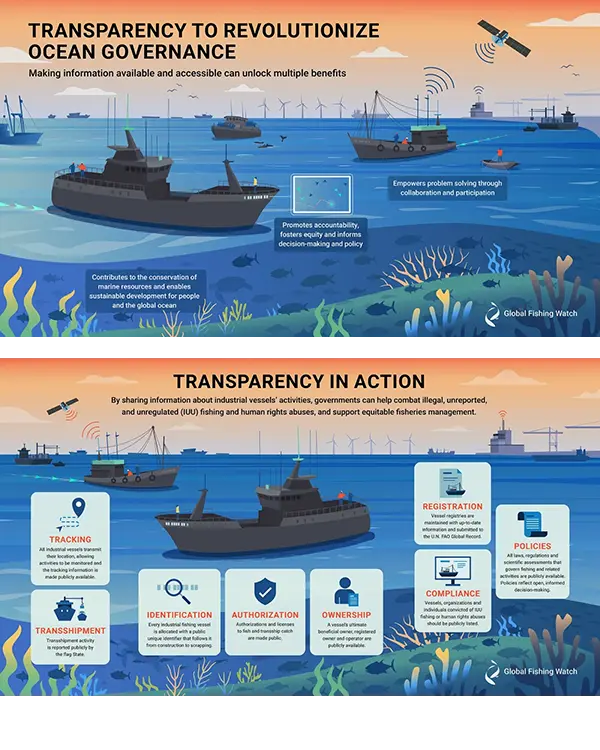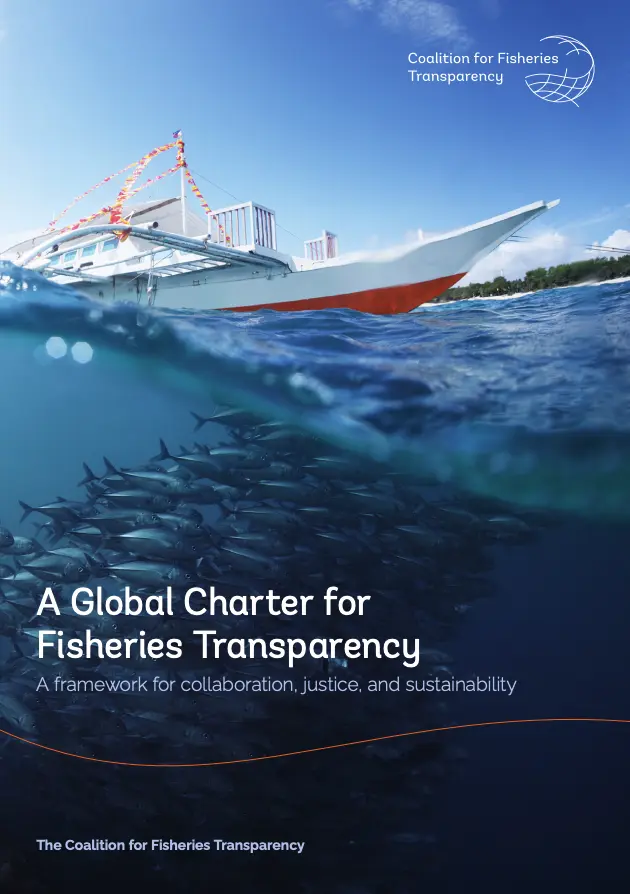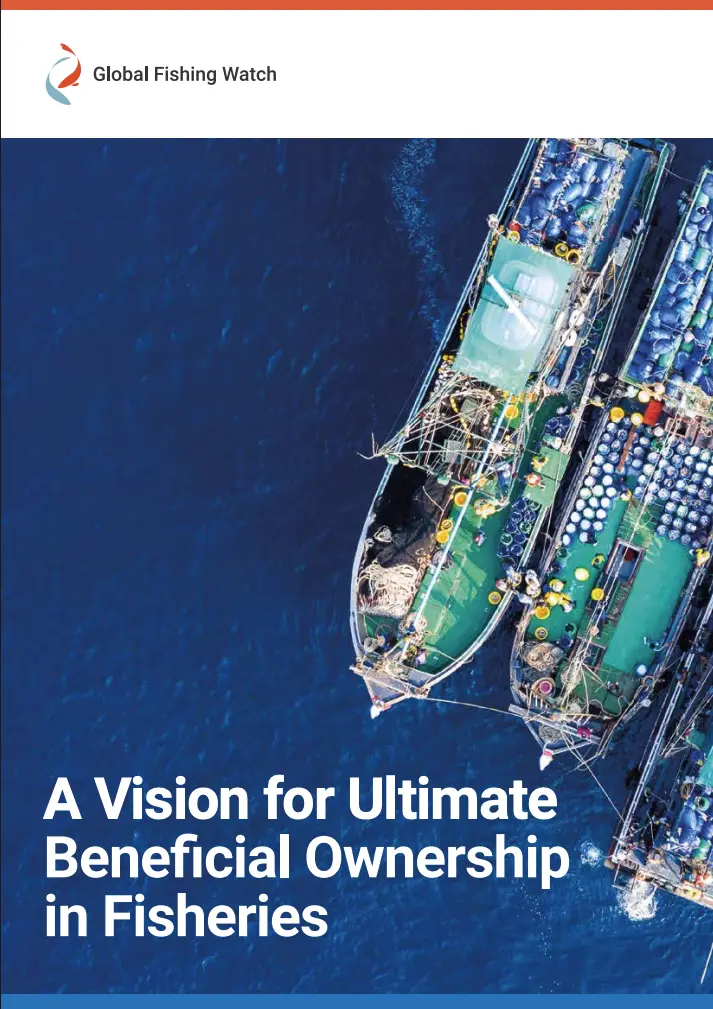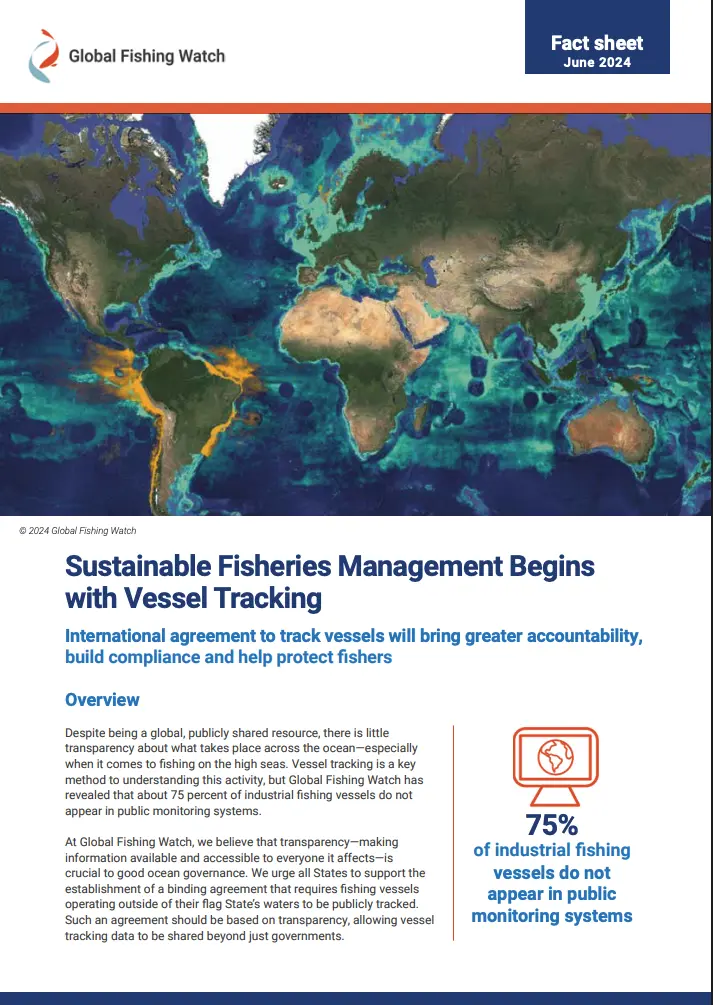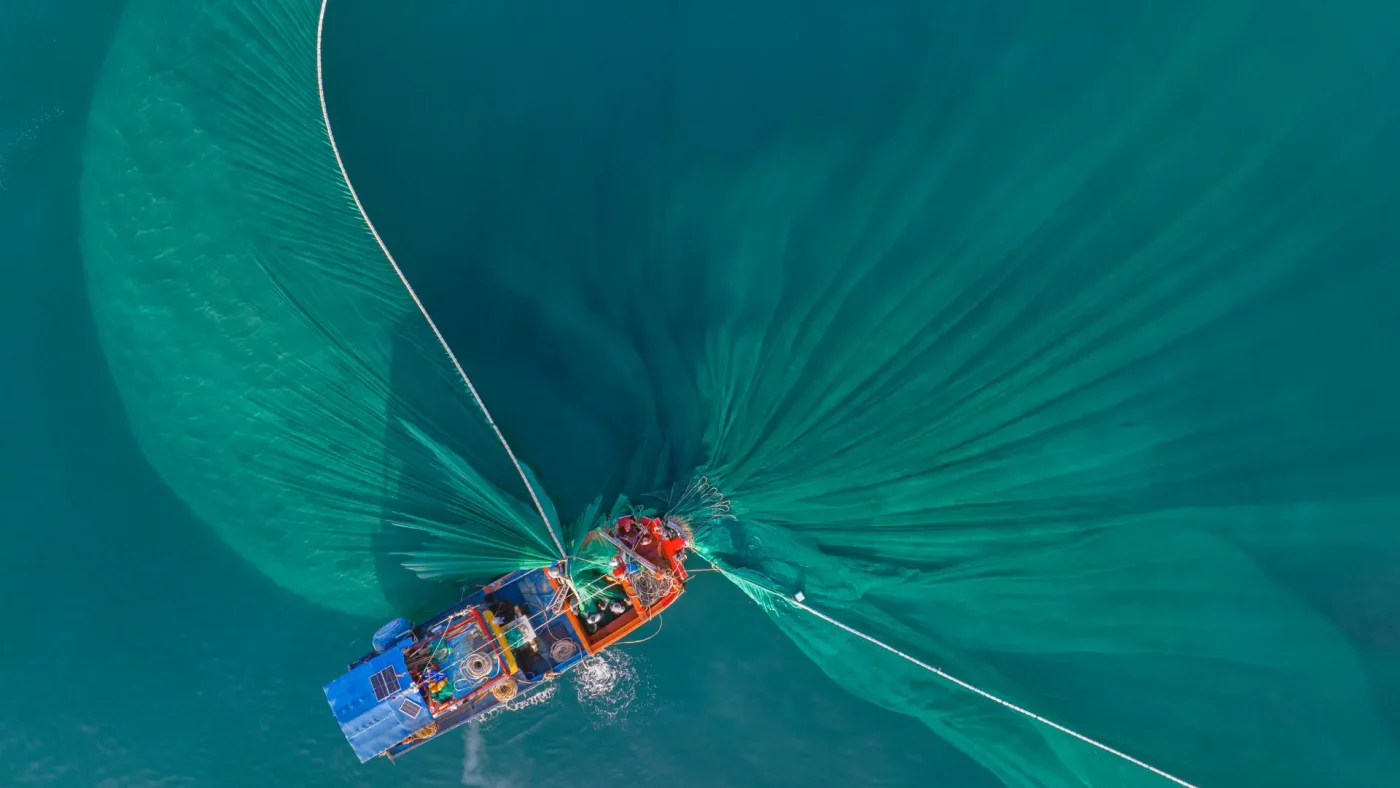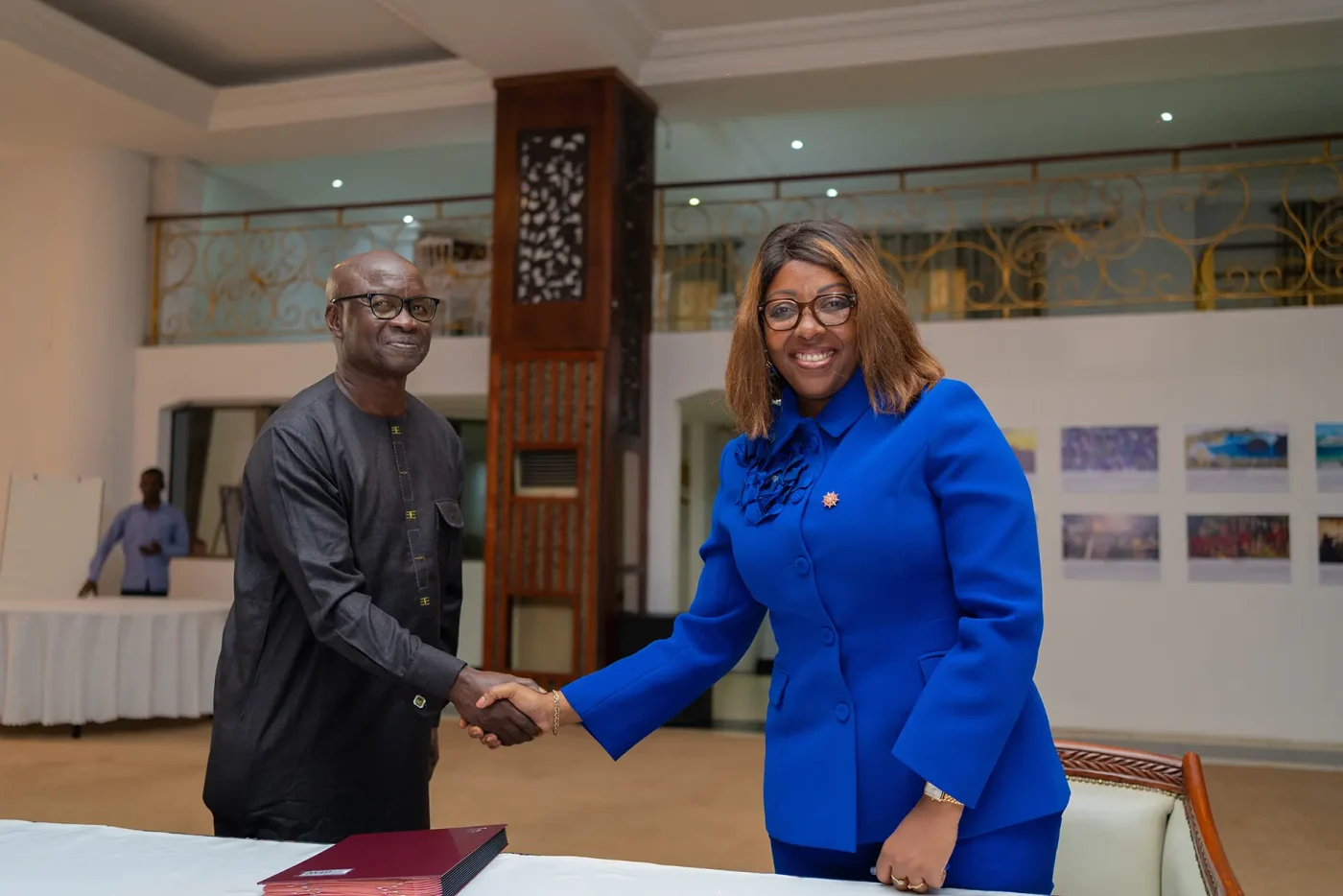Impact through policy
Transforming how we manage the ocean begins with those who shape the rules that govern it. Building a system that supports thriving fisheries, protects marine biodiversity and ensures transparency for all stakeholders takes dedicated, coordinated work with the institutions that shape international policy.
At Global Fishing Watch, we recognize that effective ocean governance depends on strong institutions, informed decisions and equitable access to information. We work alongside international bodies — from the United Nations and its specialized agencies to regional fisheries management organizations (RFMOs) and multilateral institutions — to strengthen transparency, accountability and equity across the global ocean policy landscape.
Through technical expertise, open data tools and targeted engagement, we help shape policies that safeguard marine ecosystems and support the communities that rely on them.
One goal above all: transparency
To secure and maintain a thriving, healthy ocean far into the future demands strong policies on multiple levels. Our primary policy goal — establishing and ensuring transparency — serves as the cornerstone for all of our international engagements.
This involves ensuring that United Nations (U.N.) agencies, RFMOs, development banks and other international institutions make information— encompassing ocean and vessel data as well as the policies and decisions that surround them—available and accessible to everyone it affects.
We specifically aim to:

Reduce illegal, unreported and unregulated (IUU) fishing and other destructive fishing practices through comprehensive measures that encompass robust monitoring, control and surveillance, international cooperation and capacity building.
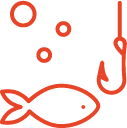
Protect small-scale fishers by advocating for international policies grounded in transparency that safeguard their fishing grounds from industrial fleets, habitat destruction and the various effects of climate change.

Improve and expand ocean protections by harnessing open data, technology and transparent management practices to support governments with the effective designation and monitoring of marine protected areas and other effective area-based conservation measures.
What we do
Global problems need global solutions. We are on the cusp of a revolution in ocean governance, where transparency evolves from a progressive ideal into a powerful, inclusive tool for managing our shared seas. Challenges like IUU fishing, support for small-scale fisheries, biodiversity loss and inequitable access to ocean data cross borders and demand coordinated international policy responses.
Securing recognition of transparency as a tool for greater ocean governance
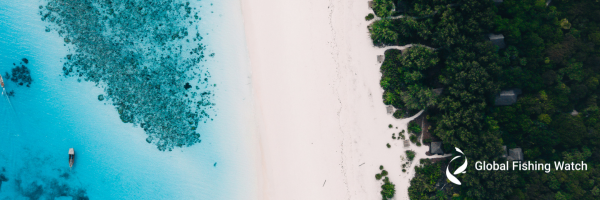
International forums are where policies are discussed and formulated. Most ocean policymakers operate within the U.N. framework, whose recognition and endorsement of policies enables global change, enhances policy credibility and fosters greater accountability in ocean governance decisions. Global Fishing Watch has successfully established transparency as a recognized ocean governance principle through the 2024 UN Sustainable Fisheries Resolution — a landmark achievement that sets new global standards for accountable ocean management.
“The United Nations recognizes the importance of transparency and the use of technology in fisheries, as part of policies to combat illegal, unreported and unregulated fishing”.
– United Nations General Assembly, December 3 2024, A/79/L.38
The Third Session of the United Nations Ocean Conference in 2025 reiterated this call for greater transparency – calling for “decisive and collective action to ensure sustainable fisheries and aquaculture systems, including by, inter alia, enhancing transparency, the use of technology, enhancing science- and knowledge-based management, promoting, scaling up and replicating successes and working together to end illegal, unreported and unregulated fishing” in the Our ocean, our future: united for urgent action resolution.
Enhancing transparency as a global principle in ocean governance enhances the protection of small-scale fishing communities, strengthens marine conservation efforts and combats IUU fishing practices. Building on this success, Global Fishing Watch continues to champion transparency across international forums to ensure it remains central to responsible ocean governance.
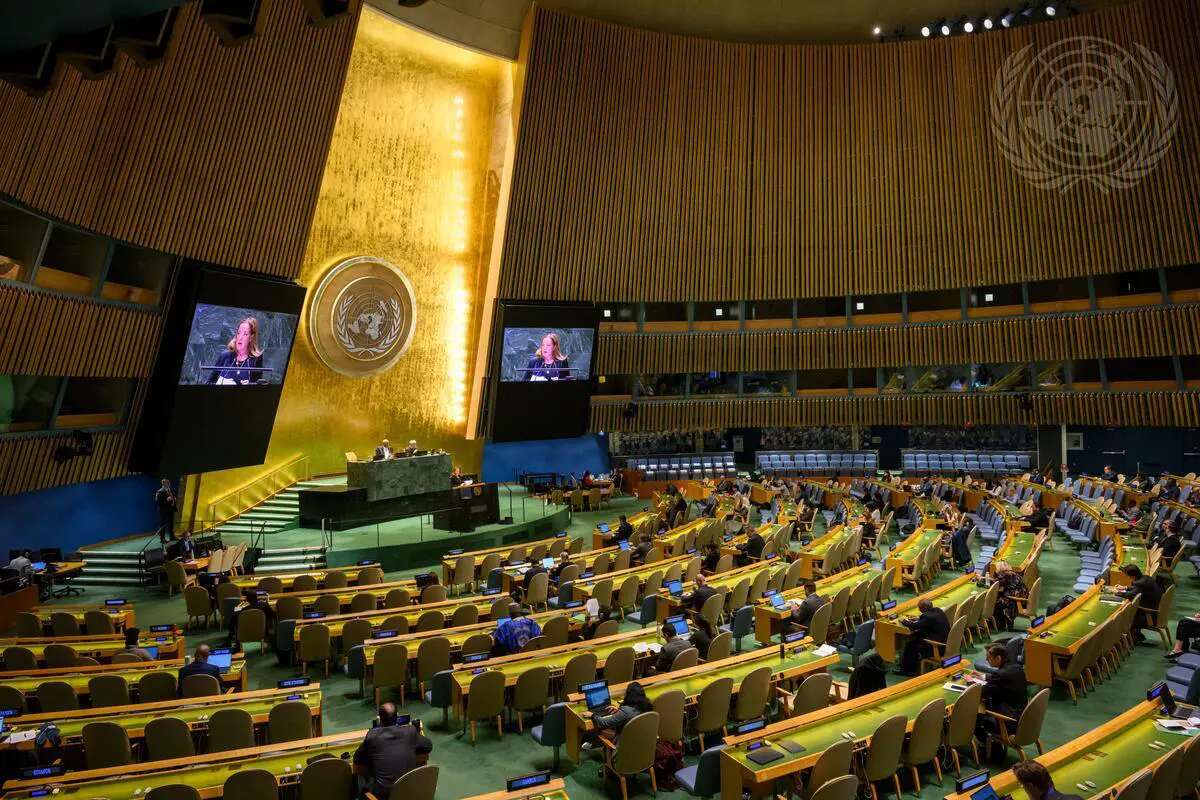
Global Fishing Watch welcomes adoption of United Nations sustainable fisheries resolution
NEW YORK, United States – Global Fishing Watch, the leading international nonprofit organization dedicated to advancing ocean governance through increased transparency...
Driving policy for transparent vessel
tracking

Vessel tracking enables us to better understand what is happening at sea by providing information on a given vessel as to its whereabouts and activities. A major challenge in monitoring large scale industrial fishing vessels is the global inconsistency in tracking practices. Global Fishing Watch research suggests that about 75 percent of industrial fishing vessels are not publicly tracked. Over time, different countries, regional fisheries bodies and international organizations have all created their own sets of rules on how they track their vessels. This hinders effective monitoring and understanding of what’s happening at sea — creating gaps and loopholes that present opportunities for non compliance and illicit activity. Global Fishing Watch is working closely with governments to help them update their national policies so that all fishing vessels operating beyond their own waters are required to be publicly trackable. At the same time, we are pushing for strong, enforceable vessel tracking rules at the regional level through RFMOs and we are building synergies between actors to make public tracking the norm, not the exception, in international binding standards.
During the 35th Session of the FAO Committee on Fisheries in 2022, countries called for the FAO to look into this issue further, recommending a technical workshop on vessel tracking be held and recommendations to address tracking challenges be made. Given the problems with the current system, a transformation in how vessel tracking functions is needed. A new, international system is required that will create a universal framework for minimum vessel tracking standards. This would level the playing field for all fishers and States and address the numerous problems encountered by the current system.
Exposing hidden ownership at sea through greater transparency
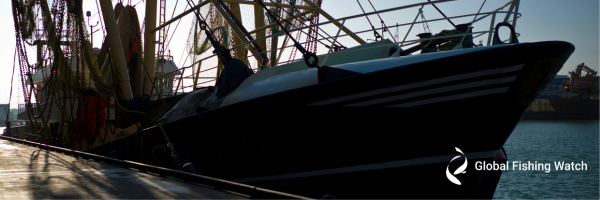
Effective ocean governance starts with knowing who’s really in control. While vessels may be flagged under different countries or operated by hired crews, the ultimate beneficial owners (UBOs) — the individuals who ultimately own or profit from a vessel — often remain hidden behind layers of shell companies or complex ownership structures.
At Global Fishing Watch, we see UBO transparency as a crucial piece of the puzzle in tackling IUU fishing. Without clear insight into who truly benefits from illicit fishing activities, enforcement efforts frequently end at the ship’s deck, leaving the real decision-makers untouched.
Beneficial ownership transparency was recently recognised as crucial to tackling IUU fishing by the Organization for Economic Cooperation and Development (OECD) and its Members, who called for countries “to improve ownership transparency in all sectors” in their 2025 Recommendation of the OECD on eliminating government support to IUU fishing.
By integrating UBO information into fisheries registries and international systems like the FAO Global Record, and linking this data with Global Fishing Watch’s products, we can create a connected, transparent framework that alerts authorities to errors, discrepancies or missing data — helping governments and enforcement agencies identify and sanction those truly responsible. Transparent UBO data is essential to disrupt harmful practices, strengthen governance and ensure our oceans are sustainably and fairly managed. We’re assisting countries in their efforts to transform their policies and operational practices so that they regularly collect, use and submit vessel records, including ownership data, to regional fisheries bodies and the FAO Global Record.
Ensuring equitable access to innovative tools and technologies
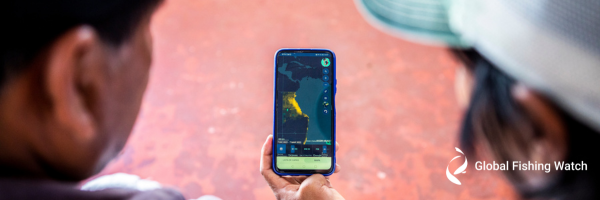
Many nations around the world have advanced systems in place that allow them to quickly collate information, automatically cross-check data fields from different sources and highlight potential issues to authorities for further investigation. Timely and up-to-date information sharing is critical for preventing, deterring and eliminating IUU fishing.
However, developing these bespoke tools is cost and labour intensive, and not everyone has the resources to do it – meaning they remain reliant on manual reviews of key vessel identity, ownership, authorisation and tracking information. Even authorities with large teams dedicated to this issue will be unable to check records for every flagged vessel, licence request and port entry one by one.
The international community has already developed the infrastructure for these data to be stored and shared in a consistent way; the FAO Global Record and RFMO authorised vessel lists aim to do just that. By making vessel registries comprehensive and interoperable – that is able to be exchanged among different systems – population of these records can be automated, increasing the quality and quantity of transparent fishing information and reducing the workload of authorities that come with multiple, slightly different reporting requirements.
Countries are increasingly recognising the value of establishing consistent and standard operating procedures to enable their national vessel registries to be used in this way and facilitate automated data exchanges at the regional and international levels. The Indian Ocean Tuna Commission and the FAO have recently established such a system to automatically transfer electronic port inspection data and assist officials in port inspections.
Harnessing our in-house technological expertise, we will support States to improve their registries, incorporate ownership information and share comprehensive, up to date vessel records publicly, regionally and internationally.
Exposing hidden ownership at sea through greater transparency
At the 2022 United Nations Ocean Conference, a group of governments and other stakeholders came together and committed to tackling IUU fishing by supporting the IUU Fishing Action Alliance Pledge. The pledge commits members to join and effectively implement international agreements to stop IUU fishing, conduct effective monitoring, control and surveillance and improve transparency and data sharing. Global Fishing Watch was a founding supporter of the Alliance and seeks to work alongside members to secure support for ambitious proposals to advance transparency at the international and regional levels.
Building momentum with RFMOs
RFMOs wield significant power, overseeing vast areas of the ocean and establishing crucial regulations, such as catch limits and gear restrictions for target species. Global Fishing Watch has what’s called “observer status” at six RFMOs:
- The International Commission for the Conservation of Atlantic Tunas (ICCAT)
- The South Pacific Regional Fisheries Management Organisation (SPRFMO)
- The Inter-American Tropical Tuna Commission (IATTC)
- The Western and Central Pacific Fisheries Convention (WCPFC)
- The General Fisheries Commission for the Mediterranean (GFCM)
- The North Pacific Fisheries Commission (NPFC)
This status grants Global Fishing Watch the authority to attend meetings, participate in the discussions and influence the policy behind binding measures for conservation and the sustainable management of fisheries. We aim to play a proactive and influential role in the sustainable management and conservation of global fisheries, contributing to healthier marine ecosystems and more transparent, sustainable fishing practices.
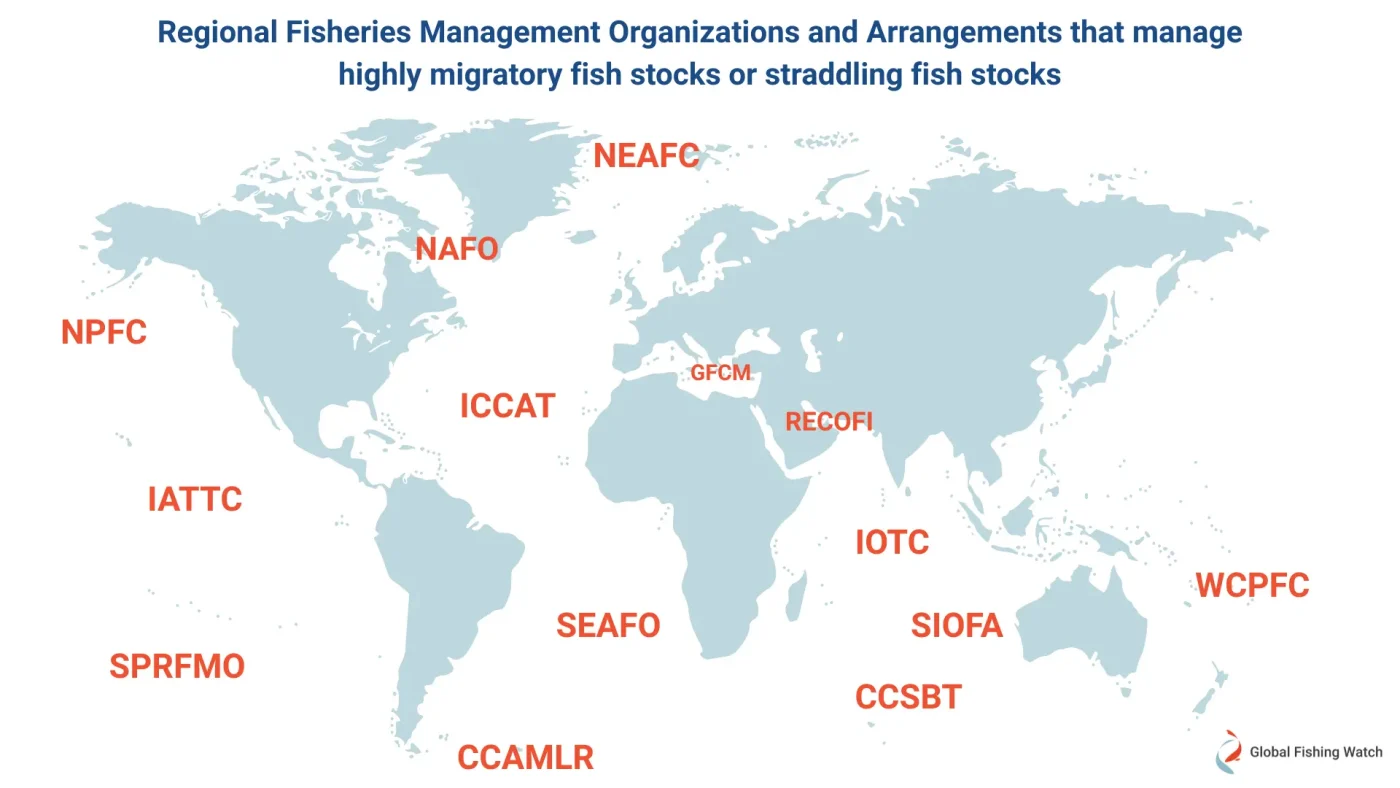
Resources for decision-makers
Explore our resources to discover the evidence and real-world policy insights driving more transparent and accountable ocean governance.
Coalitions
A Global Charter for Fisheries Transparency: A framework for collaboration, justice, and sustainability.

